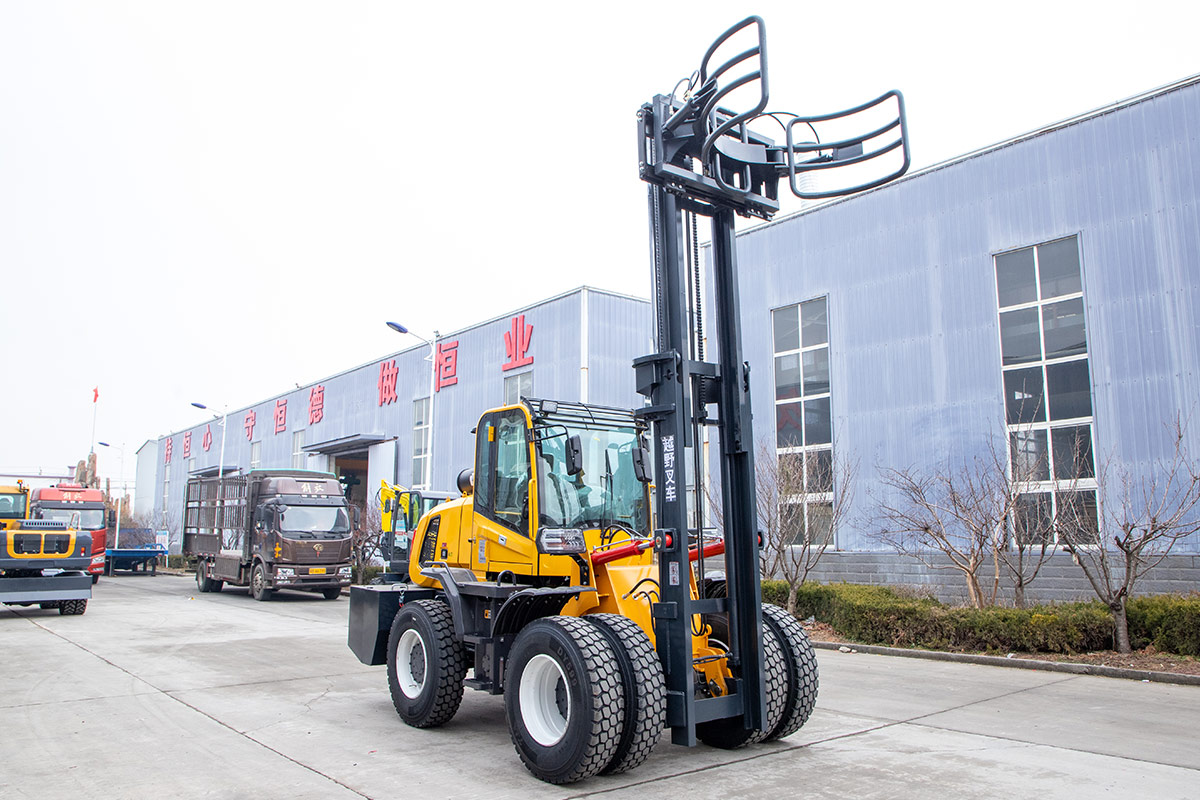How much do you know about the types and characteristics of forklifts?

Forklift, as an important handling tool for modern logistics transportation, is a variety of wheeled handling vehicles for loading and unloading, stacking, short-distance transportation, and heavy object handling of palletized goods. Widely used in ports, stations, airports, freight yards, factory workshops, warehouses, distribution centers and distribution centers, etc., and can enter cabins, carriages and containers for loading, unloading and handling of palletized goods. It is a must in pallet transportation and container transportation. less equipment.
The use of forklifts can realize the mechanization of loading, unloading, and handling operations, reduce labor intensity, save a lot of labor, improve work efficiency, shorten the working time of loading, unloading, handling, and standard yards, speed up the turnover of materials and vehicles, and greatly improve the utilization of warehouses. High efficiency, promoting the development of warehouses to multi-storey shelves and high-bay warehouses, while reducing damage to goods and improving the safety of operations.
Forklifts can generally be divided into three categories: electric forklifts, storage forklifts and internal combustion forklifts.
1. Electric forklift
The electric motor is used as the power, and the battery is used as the energy source. The carrying capacity is 1.0-4.8 tons, and the working channel width is generally 3.5-5.0 meters. Because there is no pollution and low noise, it is widely used in the working conditions with high environmental requirements, such as medicine, food and other industries. Since each battery generally needs to be charged after working for about 8 hours, a spare battery should be equipped for multi-shift working conditions, and there should be a special charging place in the workplace.
2. Storage forklift
Storage forklifts are mainly forklifts designed for cargo handling in warehouses. Except for a few storage forklifts (such as manual pallet forklifts) that are driven by manpower, others are driven by electric motors. They are widely used in the storage industry because of their compact body, flexible movement, light weight and good environmental performance. When working in multiple shifts, motor-driven storage forklifts need to have backup batteries, and there should be a special charging point at the workplace.
(1) Electric Pallet Handling Forklift
The carrying capacity is 1.6-3.0 tons, the width of the working channel is generally 2.3-2.8 meters, and the lifting height of the fork is generally about 210mm. It is mainly used for horizontal handling and cargo loading and unloading in the warehouse. Generally, there are two operation modes of walking type and standing driving type, which can be selected according to the efficiency requirements.
(2) Electric pallet stacking forklift
The carrying capacity is 1.0-1.6 tons, and the working channel width is generally 2.3-2.8 meters. Structurally, it has more masts than electric pallet trucks. The lifting height of the fork is generally within 4.8 meters. It is mainly used for goods stacking and loading and unloading.
(3) Reach truck
The carrying capacity is 1.0-2.5 tons. The mast can be moved forward or retracted as a whole. When retracted, the working channel width is generally 2.7-3.2 meters, and the lifting height can reach up to about 11 meters. It is often used for medium-height stacking and picking in warehouses. Cargo work.
(4) Electric picking forklift
In some working conditions (such as the distribution center of the supermarket), it is not necessary to ship the entire pallet, but to select a variety of goods according to the order to form a pallet. This process is called picking. According to the height of the picked goods, electric picking forklifts can be divided into low-level picking forklifts (within 2.5 meters) and medium-high picking forklifts (up to 10 meters).
The carrying capacity is 2.0-2.5 tons (low position), 1.0-1.2 tons (middle and high position, with cab lift).
(5) Low driving three-way stacking forklift
Usually equipped with a three-way stacking head, the forklift does not need to turn, and the fork can rotate to realize the stacking and picking of goods on both sides. The channel width is 1.5-2.0 meters, and the lifting height can reach 12 meters. The cab of the forklift is always on the ground and cannot be lifted. Considering the limitation of the operating field of vision, it is mainly used for working conditions where the lifting height is less than 6 meters.
(6) High driving three-way stacking forklift
Similar to the low-position driving three-way stacking forklift, the high-position driving three-way stacking forklift is also equipped with a three-way stacking head, the channel width is 1.5-2.0 meters, and the lifting height can reach 14.5 meters. The cab can be raised, the driver can clearly observe the goods at any height, and can also perform picking operations. The high-position driving three-way stacking forklift is better than the low-position driving three-way stacking forklift in terms of efficiency and various performances, so this model has gradually replaced the low-position driving three-way stacking forklift.
(7) Electric tractor
The tractor is driven by an electric motor, and uses its traction capacity (3.0-25 tons) to pull several carts loaded with goods. It is often used for the transportation of large quantities of goods in the workshop or between workshops, such as the transportation from the warehouse of the automobile manufacturing industry to the assembly line, and the transportation of luggage at the airport.
3. Internal combustion forklift
Internal combustion forklifts are divided into ordinary internal combustion forklifts, heavy forklifts, container forklifts and side forklifts. Generally, diesel, gasoline, liquefied petroleum gas or natural gas engines are used as power, and the carrying capacity is relatively large. Generally, it can carry a weight of more than 5 tons. Considering the exhaust emission and noise problems, it is usually used outdoors and has no special requirements for exhaust emission and noise. place. Due to the convenience of fuel replenishment, it can realize continuous operation for a long time, and it is also capable of working in harsh environments.
